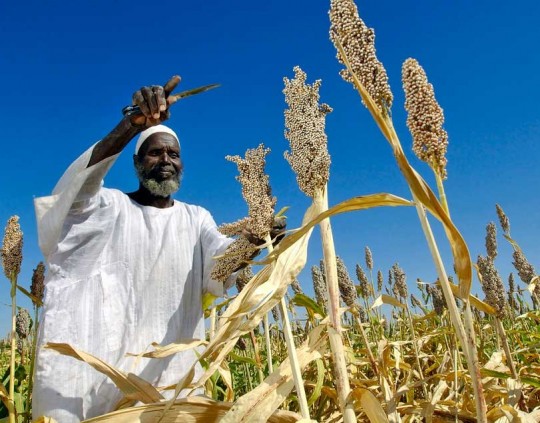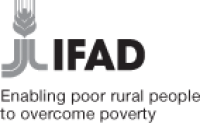UN rural poverty agency unveils billion-dollar funding target
UN rural poverty agency unveils billion-dollar funding target

Member States of the United Nations’ rural development arm announced today that they will aim to raise $1.5 billion in new contributions to support the agency’s efforts to bolster the living conditions of rural poor across the developing world.
With almost two billion rural people worldwide depending for their livelihoods on an estimated 500 million smallholder farms in developing countries, the UN’s International Fund for Agricultural Development (IFAD) aims to fill a crucial niche, focusing its efforts in the areas of food and income security.
“This significant support from IFAD’s Member States, especially during these challenging global economic times, demonstrates extraordinary resolve and political will to give agriculture a major boost and help the world’s small farmers find their way out of poverty,” IFAD President Kanayo F. Nwanze said.
The injection of new funds will fuel IFAD’s role in building an international development architecture for the world’s poorest people, the agency said in a press release. About 40 to 50 per cent of the financing is expected to be redirected to development projects across Sub-Saharan Africa.
Every three years, the resources that IFAD provides as loans and grants to developing countries are replenished by Member States during a consultation period at the agency’s headquarters in Rome, Italy.
The agency then leverages the contributions in an effort to mobilize greater funding through project co-financing with national governments, international donors, and the private sector.
###
IFAD Member States announce US$1.5 billion new funds for food security in developing countries
Rome, 16 December 2011–Member States of the International Fund for Agricultural Development (IFAD), meeting in Rome for Consultations on the Ninth Replenishment of the Fund’s resources (IFAD9), announced a target of US$1.5 billion in new contributions to finance agriculture and rural development projects across the developing world. This represents a 25 per cent increase over IFAD’s Eighth Replenishment.
Every three years, the resources IFAD provides as loans and grants to developing countries are replenished by Member States. The Fund leverages member contributions to mobilize much higher amounts of funds through project co-financing with national governments, international donors and the private sector. IFAD’s work fills an important niche, with almost 2 billion rural people depending for their livelihoods on the 500 million smallholder farms in developing countries.
The injection of new funds from Member States is a confirmation of IFAD’s vital role in international development architecture as an effective organization delivering results in the area of food and income security, especially for the poorest people. Forty to fifty per cent of these resources will be channelled to Sub-Saharan Africa for development projects.
Member States recognized IFAD as a highly efficient organization among international financial institutions and United Nations (UN) agencies. They commended its work to deliver value for money and made unprecedented efforts to overcome the effects of widespread budgetary difficulties to ensure that the Fund has sufficient resources to do its job for poor rural people worldwide.
“This significant support from IFAD’s Member States, especially during these challenging global economic times, demonstrates extraordinary resolve and political will to give agriculture a major boost and help the world’s small farmers find their way out of poverty,” said IFAD President Kanayo F. Nwanze.
Echoing the spirit of global development partnership emerging from the Fourth High Level Forum on Aid Effectiveness in Busan, Republic of Korea, earlier this month, the replenishment cements IFAD’s unique status. Since its establishment, IFAD has been an example of global development partnership, with members from the Organization of the Petroleum Exporting Countries (OPEC), other developing countries and the Organisation for Economic Co-operation and Development (OECD) playing an active role in the Fund’s governance. For IFAD9, all of these partners contributed to the upward trend of pledges.
A number of developing countries that had not participated in previous replenishments announced their contributions, including some from the UN list of “least developed countries”. The IFAD9 replenishment is the highest percentage increase of contributions of any international financial institution in the current round of replenishments.
Pledges during the two-day Consultation point to an upward trend.
Some countries pledged far more than the amounts contributed to IFAD to earlier replenishments. The Report and the Resolution of the Consultation will be submitted to the Governing Council for adoption in February 2012.
In addition to the new funds, Member States mandated IFAD to find new sources of finance that effectively share the development burden more broadly, including raising investment from non-members and others.
###
The International Fund for Agricultural Development (IFAD), a specialized agency of the United Nations, was established as an international financial institution in 1977 as one of the major outcomes of the 1974 World Food Conference. The Conference was organized in response to the food crises of the early 1970s that primarily affected the Sahelian countries of Africa. The conference resolved that “an International Fund for Agricultural Development should be established immediately to finance agricultural development projects primarily for food production in the developing countries”. One of the most important insights emerging from the conference was that the causes of food insecurity and famine were not so much failures in food production, but structural problems relating to poverty and to the fact that the majority of the developing world’s poor populations were concentrated in rural areas.
IFAD is dedicated to eradicating rural poverty in developing countries. Seventy-five per cent of the world’s poorest people – 1.4 billion women, children and men – live in rural areas and depend on agriculture and related activities for their livelihoods.
Working with rural poor people, governments, donors, non-governmental organizations and many other partners, IFAD focuses on country-specific solutions, which can involve increasing rural poor peoples’ access to financial services, markets, technology, land and other natural resources.
IFAD’s mission is to enable poor rural people to overcome poverty.
* Official website: http://www.ifad.org/
###
> United Nations (UN).
 The United Nations was established on 24 October 1945 by 51 countries committed to preserving peace through international cooperation and collective security. Today, nearly every nation in the world belongs to the UN: membership totals 192 countries.
The United Nations was established on 24 October 1945 by 51 countries committed to preserving peace through international cooperation and collective security. Today, nearly every nation in the world belongs to the UN: membership totals 192 countries.
When States become Members of the United Nations, they agree to accept the obligations of the UN Charter, an international treaty that sets out basic principles of international relations. According to the Charter, the UN has four purposes:
- to maintain international peace and security;
- to develop friendly relations among nations;
- to cooperate in solving international problems and in promoting respect for human rights;
- and to be a centre for harmonizing the actions of nations.
###
* The above story is adapted from materials provided by United Nations (UN)
** More information at United Nations (UN)





















